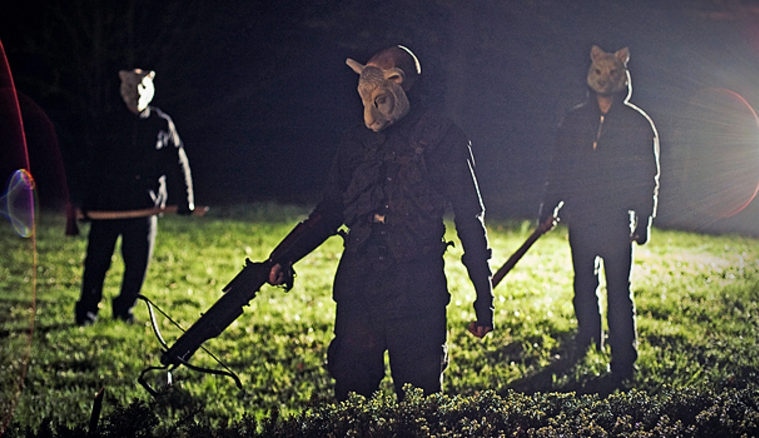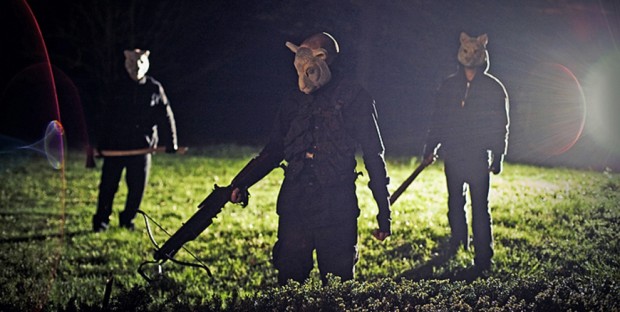
Hitting theaters today is You’re Next, a film many fans of the horror genre have been waiting for for nearly two years. The home invasion genre has been saddled with remakes of classic films and rehashes of standard plotlines and finally, in director Adam Wingard and writer Simon Barrett, we have a duo that at least attempts to break the mold and go in new directions. Some of it works like gangbusters, while some of it feels a bit overwrought, but the experience as a whole is almost a revelation as to the way horror can continually surprise you.
So it was with great pleasure that I was able to sit down with Barrett and Wingard during a roundtable to discuss the inspirations, the fantastic music throughout the film, the way they had to make Barbara Crampton look older than she was, the look of the killers, and much more. Read before or after seeing the film, this is a thoroughly entertaining and informative discussion of the movie. As always, I’ve noted a spoiler near the end even though some might consider it minor in consideration of all the trailers being run, I am here to keep the experience as unspoiled as possible. Read on and enjoy the conversation.
You have a great cast. How did you incorporate someone like Barbara Crampton into the mix?
Simon Barrett: I’m a huge fan of Re-Animator and From Beyond and that’s kind of a weird story because Adam and I were having a really hard time casting You’re Next, initially. We had our friends and our filmmaker buddies, who we know are great actors, but other than that, people kind of weren’t getting that we were trying to do something new. They would just read the script and were like, ‘oh, this is a low-budget slasher horror and you’re shooting in Missouri. No thanks.’ And we just had A Horrible Way to Die screen at Fantastic Fest and afterwards Jeffrey Combs and Stuart Gordon came up to me and were like, ‘oh, we really loved it.’ And that was amazing to hear as huge fans of both of them.
But then when it came to casting You’re Next, I was like, ‘you know who would vouch for us?’ If we go up to Barbara Crampton, who is an amazing actress and she’s basically retired. She did films as a young woman and now she’s become a mother and is just chilling up in San Francisco. If we had sent the script out to Barbara Crampton and then she calls Jeffrey Combs and Stuart Gordon they’ll totally vouch that we’re legitimate filmmakers, because A Horrible Way to Die hadn’t come out yet and if you looked at the films we had made you couldn’t tell that we were trying to make a real movie and do something different. The funny thing is that she read the script and was just like, ‘great, I love it. I’ll do it.” She only found that out about herself a couple months ago.
 Adam Wingard: It was really funny, because Barbara still looks so stunning and the first time I even met her was literally the day or two before we started shooting. I talked to her over the phone, but we had this cast and crew dinner and I showed up and I was a little late before and Barabra was already there. I was just thinking, ‘oh, who is that really hot girl over there?’ We actually had to really dress her up and make her up to make her look older and more like a domesticated housewife, kind of.
Adam Wingard: It was really funny, because Barbara still looks so stunning and the first time I even met her was literally the day or two before we started shooting. I talked to her over the phone, but we had this cast and crew dinner and I showed up and I was a little late before and Barabra was already there. I was just thinking, ‘oh, who is that really hot girl over there?’ We actually had to really dress her up and make her up to make her look older and more like a domesticated housewife, kind of.
Barrett: I mean she’s just not that much older than AJ [Bowen] and Joe [Swanberg] and so I think if Barbara’s age was her character’s age I think she would have had to have kids when she was 14 or something. The cool thing about Barbara is that she’s an ego-less actress. We were like, ‘we’re going to make you look much older!’ You’re coming out of retirement and we’re going to make you look way older than you actually look and she was just like, ‘ok, cool.’ She knew it was right for the role. Hopefully people see You’re Next and a new generation of filmmakers will discover Barbara Crampton because she’s an amazing actress and a total pleasure to be around.
It seems like a very funny set to be a part of, a group of friends got together and do a movie. Was that the aspiration?
Wingard: Our aspirations was to make a movie that was both friendly to fans of horror and all the subgenres therein that we’re riffing on, but also one that could play for a mainstream audience. That meant having to use more conventional filmmaking language to be able to try and convey that. Before all the decisions I made stylistically in our other movies were largely based on what the budget was. To get something across, you needed to do tricks just get the movie done and that was the whole process of those earlier films. It wasn’t like, ‘how do we make the best movie possible?’ It was like, ‘how do we make a movie, period, with this money we have.’ And this was the first time, ever, where we were saying to ourselves, ‘this is the script that Simon wrote. What is the best version possible to reach the audience that it’s supposed to?’ That creates a lot of challenges because you can’t just fall back on experimental ideas and editing techniques like I was before. That meant that the coverage was much more intensive and the performances just had to be that much more solid and everything had to be there, which just made it a very stressful set to be on, to try and get all that. Especially for our first time, maybe it won’t be like that next time.
I was also in a lot of pain during the film because about a day before shooting started I had this problem with my tooth, that pain that happens when you need a root canal started and I didn’t have any time to go to the dentist during the production. The two times that I did sneak away on our off days, the dentist couldn’t figure out what was going on. Basically I was eating seven Tylenol every three hours, because I didn’t want to take painkillers on set. Also, I didn’t have any. Fortunately, and this is going to sound bad, but Simon’s dog had a terminally ill dog that just died and she had this huge jar of dog tranquilizers — well, they were painkillers, basically low-level morphine. I’d have to take a couple just to feel anything, but before I went to bed every night I took these dog painkillers and fell asleep and then got up and went to set. I was totally miserable, physically and most of the cast didn’t even know cause I didn’t want to stress them out with that kind of stuff, but it was miserable making the film. Ultimately, that doesn’t matter. What matters is you get what you set out to make and the real reward is actually being able to have a product that you’re satisfied with and that’s totally what we got. All the pain and the stress — which I’m sure most filmmakers feel stressed out, so I don’t think we’re unique in that respect — it’s all worth it in the end.
Barrett: If you’re making a low-budget film, I’d say even a film at all, and you’re having a great time with your buddies, you might want to examine what you’re doing, because you’re probably not doing it right.
When you were writing the script, from the get-go did you know how the killers were going to look? Was there a choice for which animal masks you picked?
Barrett: Oh, absolutely. It was always as written and there’s two parts to that answer. The first part is yeah, obviously You’re Next is a film that hopefully has a lot of narrative surprises that are character based. So the idea of people having hidden aspects to themselves that are gradually revealed, I wanted to metaphorically express that with the animals. The tiger, who is very ferocious, the character that I play in the film, ultimately in some ways is less impressive than say, a lamb. So that was kind of the metaphor for Sharni’s character overall and that’s stuff there if you want to pay attention to it and you can ignore it if you don’t.
One of the things that we talked about while I was writing the script was that we wanted to do something scary and intense with masked killers, but how do you do something that hasn’t been done before? We’re big fans of The Strangers, as I’ve said, but you kind of are like, who are these sociopathic madmen who also have a degree in fashion design to create these really awesome masks that they somehow have? So we wanted something that looked cool and would show up at night but also had an element of feeling that these guys could get it in a store and paint themselves. It had to be true who those guys were, so animals was the way to go. I’m also a big fan of the original Wicker Man and I love the animal masks that they wear in that film so I think that’s a pretty big reference point for me, that kind of pagan culture stuff.
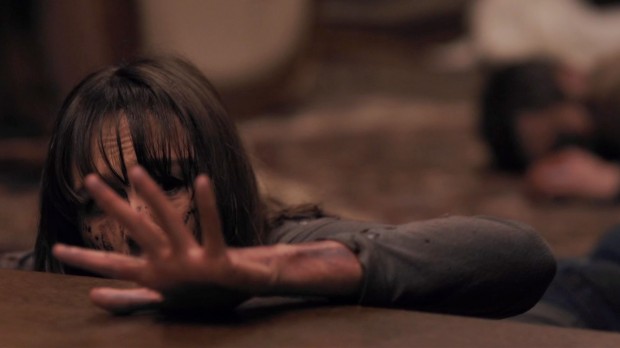
Can you talk about the music?
Wingard: Starting with the “Looking For the Magic” motif in the film, it wasn’t specifically that song in the script, but Simon had referenced there is a song on repeat that keeps playing. Growing up, Tarantino’s movies were a really big influence. I always loved how he used great pop songs that maybe you haven’t heard before. But I haven’t heard anyone capture that stuff in awhile, so going into this, it was very difficult because we had a limited music budget in the film, but I knew we wanted a song that was basically around late 70’s, early 80’s and that was the area we were looking for. But we looked at all kinds of different music, a lot of French stuff and there was this one weird Swedish song that was done to the Cannibal Holocaust theme that we were looking at. One of the composers, Kyle McKinnon, he’s just really encyclopedic about his knowledge in music and so forth and all kinds of rock music. So I told him the parameters I was looking for, basically I needed a song that sounded like a number one hit that no one’s ever heard from the 70’s, which is basically impossible and he sent me a list of nine songs and that was one of them and I listened to it. I was over at Simon’s apartment, I had no money, I was sleeping on his couch while we were developing the movie and I was in there and I was listening to it on my headphones and I was like, “Simon, come in here!” I played it for him and this was after we’d gone through a lot of different songs, but we were both like, ‘I think this is it. I think this is the song.’ And that song actually influenced a lot of the film, because once we decided that, hoping we could get the rights to it the whole time, it became a thing where me and the DP, Andrew Palermo, on the way to set everyday, we were listening to the song.
On the set, we were listening to it — the whole time, it created the sort of the tone of the movie in a way. And then on top of that, the actual score itself was a very complicated process because the film has a very interested way that the tone unfolds. It starts out as one movie and it kind of unfolds into a different type of story by the end of it. And to really achieve that, the secret to that was the music score and start it with a very ominous feel and slowly, gradually push us into that 80’s, Carpenter nonsense direction that allows you to really get involved with the fun of the story. It took quite a bit. We had Kyle and Justice Lee, they did the majority of the music. We hired another guy, Mads Heldtberg, to do a little more conventional stuff that wasn’t in their forte. Then I even ended up doing quite a few pieces myself, a lot of the more really minimal… there’s a piece in there that sounds like it’s from Commando. A lot of the minimal, Carpenter stuff I did because it’s in my capability. Initially I put a lot of stuff in there as temp stuff, because this movie had a very quick turnaround in terms of the editing, it was like three or four months from finishing shooting to premiere. We didn’t have any time to do that stuff, so I temped a lot of stuff in there and I would show Simon and Keith and Jess. They would come in the morning and I didn’t have any new music to show them, but they wanted to see new music on a scene, so I got my iPhone out and I started playing with the drum machine on there and the synth stuff and I just put it in the film and I played it for them and Keith turned to me afterwards and was like, ‘do you think we can get the rights to that song?’ I was like, ‘yeah, we can totally.’ [laughs]
Barrett: It’s going to cost you though. [laughs]
Was there anything behind the first kill being the pretentious filmmaker?
Barrett: Oh, definitely. With Adam and I, we come more from more an indie background and we’ve done dramas, but with You’re Next we kind of wanted to make a statement about what cinema is. So often people confuse that aren’t entertaining as intelligent and we wanted to try and make a movie that was fun, but also still smart. So we wanted a movie to have a point where people are debating the merits art vs. entertainment.
Wingard: And this movie was also a transitional point for us. We were going from very experimental, low-budget filmmaking to doing something more commercially viable and also, audience-friendly. So that whole dinner table scene is referencing what that kind of meant to us, and us kind of having fun with it and even poking fun at ourselves in a way.
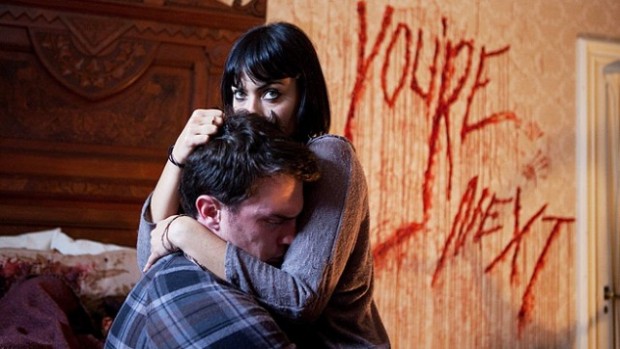
A lot of writers talk about how they can gain momentum when writing by boxing in a character and then have them fight their way out of that sequence. Can you talk about doing that in this film?
Barrett: Sure, that’s like the entire script. [laughs] Almost literally they are boxed and trying to get their way out, from page one and one. That’s a tough question to answer, because the number one moments would be huge spoilers. I really wanted to do a film that was basically characters feeling trapped and having to use their wits to get out of the situation and I wanted to come up with intelligent solutions. I didn’t want to cheat. We had to rewrite the script when we finally found a location that looked good enough to hold your attention for 90 minutes, but I did have a blueprint drawn on a sheet of paper next to me and and I was like drawing little dead bodies and weapons and stuff, just to keep it all together.
Wingard: You have to, just to keep up with it. I don’t even think I was fully prepared for that going into it because we never experienced something like that before. If somebody sets down a poker that they are holding in one scene, you have to keep up with that the rest of the film and it’s all shot out of sequence, so it becomes this crazy exercise in your mind trying to keep up with all that stuff.
Barrett: It really was. Writing You’re Next, I remember I was talking to you at one point when I was halfway through the script and I was saying there was a weird logic puzzle, trying to keep track of who was doing what and when. Especially, if you really look at the timeline of the movie, it’s pretty tight. It’s just a section of an evening really, it’s so fast-paced. I was constantly trying to remember who was where and what their motivation was so we were never cheating with any of the narrative twists and turns. So that was definitely an idea in my mind from the start.
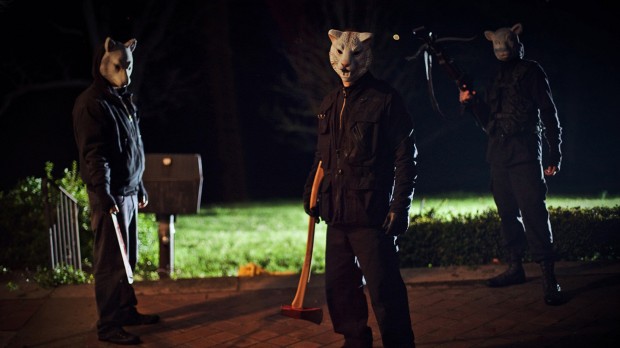
Spoilers:
When you wrote the script can you talk about avoiding some of cliches of the home invasion movie and redefining the “last woman standing” role?
Barrett: Well, the two things you just said was the creative inception of the script. Adam and I, the way we collaborate, is we’ll come up with the very germ of what we want our next film to be and at that time he was really into home invasion thrillers. We were kind of looking at the genre, which Colin Geddes calls, ‘movies in which people are tied to a chair,’ it hadn’t really done anything different since…. Michael Haneke was actually making fun of this stuff back in 1997 and it still hasn’t done anything different since then. So I was just kind of like, ‘how would I do a home invasion thriller that avoids all of those pitfalls, scenes like that.’ We knew we also wanted a strong female protagonist because that’s part of the fun. That’s again, something we thought movies weren’t doing right. To avoid cliches it was just by sitting there and being very aware of those cliches because I’ve seen all those movies. [I’d say] ‘OK, what does a film with a strong female protagonist do wrong? Well, the character is constantly talking about how tough she is, but people who are actually tough in real life, don’t talk constantly talk about it. They just are tough. That’s the character that Sharni became, and we just watched every home invasion thriller.
Wingard: The annoying thing about the final girls in a lot of horror films is that, more or less, a lot of the times they are smarter than most of the other people in the film, but by and large they just get lucky and that was something we definitely wanted to avoid in this. I guess it all started with Halloween and everybody’s been riffing on the whole “innocence thing” and I feel that’s completely irrelevant nowadays. This whole “innocence thing” is bullshit and it has no relevance to survival of any kind.
Barrett: It doesn’t make you tough in any way. Adam made a point that the final girls in these horror movies are often just the ones who got lucky. Adam always talks about making things very real to the characters and putting it in whatever the movie’s reality is, you have to be true to that. So we wanted it to be a movie where if someone survives, it’s because they have…
Wingard: ..they’ve done something to actually achieve that.
Barrett: We wanted to make a movie where people did things for a reason, including the killers. The Strangers, Them, all the movies that we love…
Wingard: That was the common thread of a lot of home invasion things and it is a scary thing, the idea of people committing crimes for almost no reason, just random acts of violence. But that’s been done and it’s been done perfectly. We had to figure out what was our take on it and really at the beginning of it, it started with the killers have to have a motivation that’s tied into the plot and then it kind of came from there.
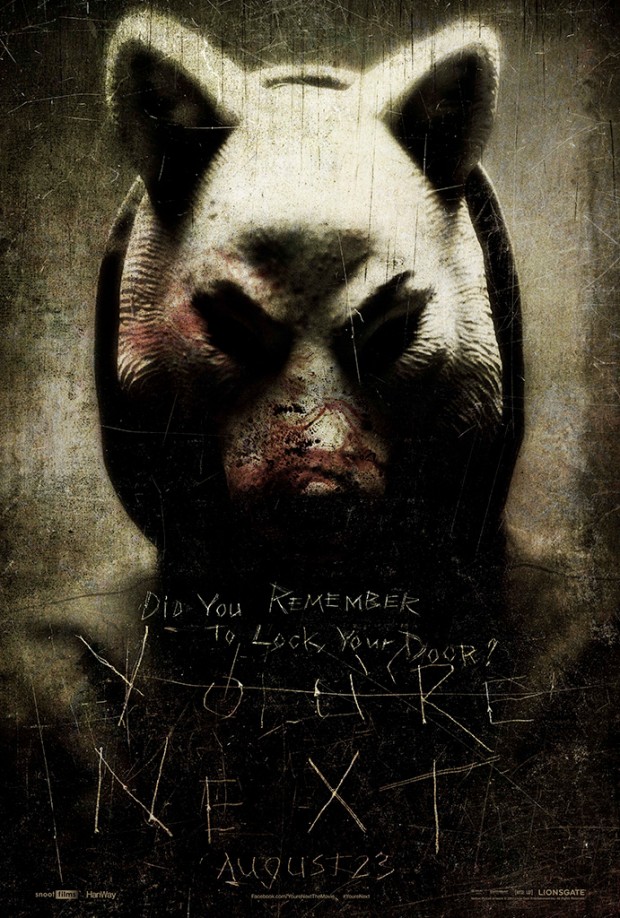
You’re Next is now in nationwide release.

